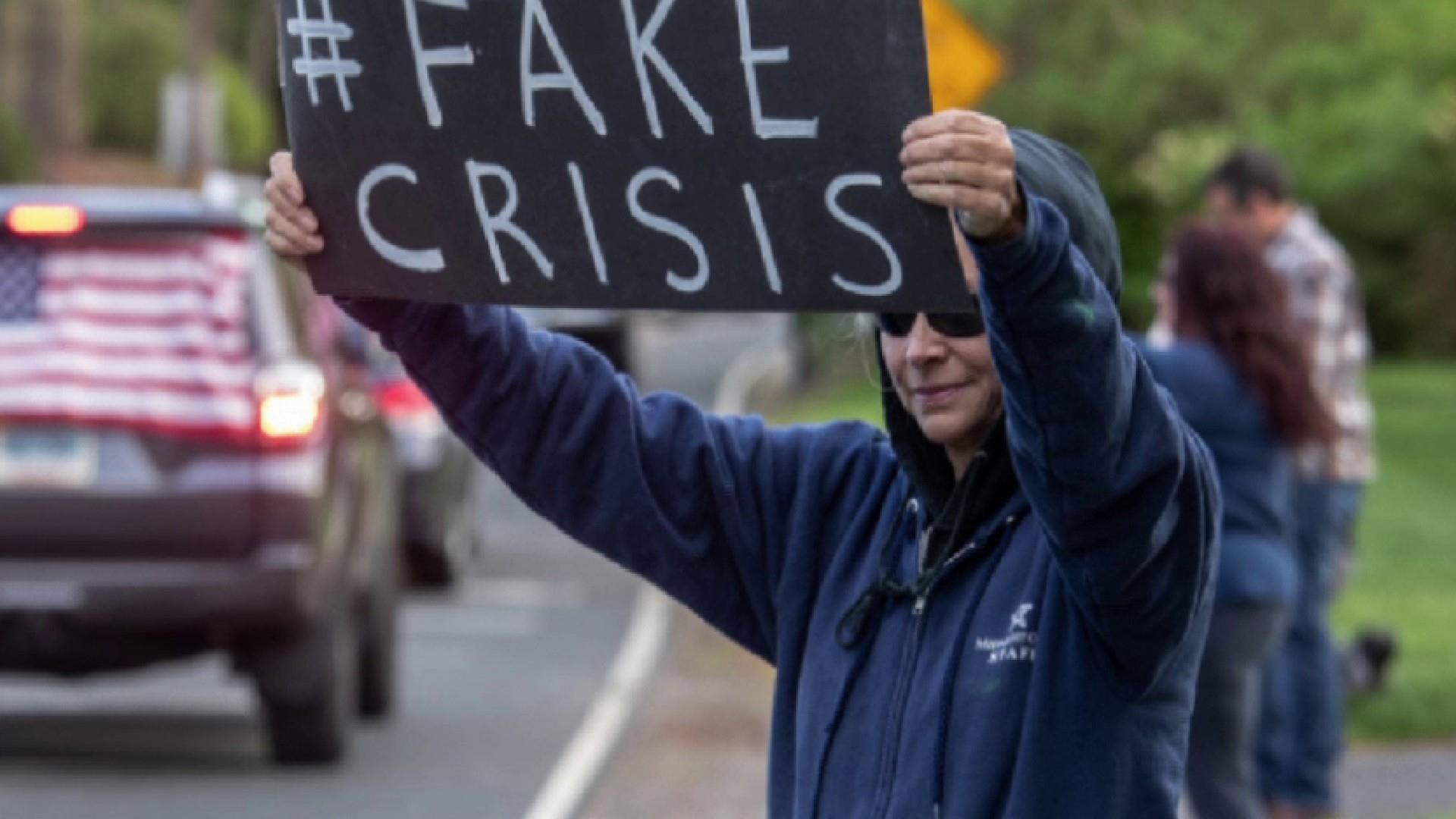 Protestor holding up sign in front of Gov. Ned Lamont's residence while protesting the state's stay-at-home order to combat the Covid 19 pandemic. (John Moore via Getty Images)
Protestor holding up sign in front of Gov. Ned Lamont's residence while protesting the state's stay-at-home order to combat the Covid 19 pandemic. (John Moore via Getty Images)
2021 was a banner year for conspiracy theories—from claims that the COVID-19 pandemic was a worldwide hoax, to beliefs about Satan-worshipping, cannibalistic pedophiles controlling the deep state. While these beliefs may seem far-fetched, they have had dramatic and tragic real-world consequences. Unfounded theories about COVID-19 led many to disregard public health guidelines, resulting in thousands of preventable deaths and hospitalizations.[1] Families, too, have found themselves divided over conspiracies flourishing on social media. These public and private tragedies have left many wondering what can be done to help those who have fallen down this rabbit hole.
 The first step in combating conspiracy theories is understanding their allure and how they exploit core psychological drivers. Cognitively, they offer an ordered view of the world, providing believers a sense of control amidst social turmoil and anxiety.[2] Our desire for order and control stems from illusory pattern perception
The first step in combating conspiracy theories is understanding their allure and how they exploit core psychological drivers. Cognitively, they offer an ordered view of the world, providing believers a sense of control amidst social turmoil and anxiety.[2] Our desire for order and control stems from illusory pattern perception![]() - the cognitive tendency to perceive meaningful patterns or connections in random or unrelated events.
- the cognitive tendency to perceive meaningful patterns or connections in random or unrelated events.
—the brain’s tendency to find meaningful patterns in random events, drawing connections and causation where none exist.[3] For individuals experiencing personal or cultural upheaval, the need to “connect the dots” becomes particularly vital.
Combined with proportionality bias![]() - the cognitive tendency to believe that significant events must have equally significant causes, while minor events have minor causes.
- the cognitive tendency to believe that significant events must have equally significant causes, while minor events have minor causes.
, the belief that significant events must have equally significant causes, makes conspiracy theories especially appealing as explanations for major crises like pandemics or natural disasters. Another key driver behind the efficacy of conspiracy theories is conformity bias![]() - the tendency for individuals to adopt the beliefs, behaviors, or decisions of a group to fit in, even when these conflict with their own beliefs or convictions.
- the tendency for individuals to adopt the beliefs, behaviors, or decisions of a group to fit in, even when these conflict with their own beliefs or convictions.
, which leads people to favor information that aligns with their preexisting beliefs while dismissing contradictory evidence.[4] This bias is amplified by the mere exposure effect![]() - the psychological phenomenon where repeated exposure to a stimulus increases an individual’s preference for it.
- the psychological phenomenon where repeated exposure to a stimulus increases an individual’s preference for it.
, as repeated encounters with the same conspiracy narratives—through memes, videos, or social media posts—can make them seem more credible.
Beyond individual needs, belief in conspiracy theories often fosters a sense of community. Conspiracies appeal to tribalism![]() - a psychological mechanism in which people categorize themselves and others into groups, fostering loyalty and favoritism toward their ingroup while stereotyping or discriminating against outgroups.
- a psychological mechanism in which people categorize themselves and others into groups, fostering loyalty and favoritism toward their ingroup while stereotyping or discriminating against outgroups.
by reinforcing in-group commitments and framing outsiders as adversaries. For example, research shows that people are more likely to believe conspiracies if they blame opposing political parties or rival social groups.[5] Such divisions are particularly potent during moments of political upheaval or scandal, when trust in institutions is already fragile.[6] Social dynamics further amplify the effect. Online communities and social media provide echo chambers where perceived patterns are shared, validated, and elaborated upon by like-minded individuals. This collective reinforcement makes the illusion of a global cabal feel not only plausible but undeniable to its adherents.
Researchers have found that the most effective way to mitigate the spread of conspiracy theories is to prevent them from taking hold in the first place. This involves warning individuals about potential misinformation they might be exposed to, so they can prepare themselves and more easily recognize conspiracy theories when they encounter them.[6]
Once conspiracy theories take hold, changing a believer’s mind becomes significantly more challenging, regardless of the strength of the evidence. This is due to the continued influence effect![]() - a cognitive phenomenon where misinformation persists in people’s minds and continues to influence their beliefs or behaviors, even after they recognize it has been debunked.
- a cognitive phenomenon where misinformation persists in people’s minds and continues to influence their beliefs or behaviors, even after they recognize it has been debunked.
, a psychological phenomenon that explains how closely-held beliefs—particularly those foundational to one's identity or worldview—persist even in the face of contradicting facts. Moreover, the backfire effect![]() - a psychological phenomenon where attempts to correct a misconception inadvertently reinforce the original belief instead of dispelling it.
- a psychological phenomenon where attempts to correct a misconception inadvertently reinforce the original belief instead of dispelling it.
can intensify this resistance, as individuals who are presented with evidence that challenges deeply held beliefs may perceive this as a personal attack, causing them to cling even more tightly to their preexisting views.”[7]
For these reasons, social psychologists and related experts recommend a more empathetic approach when engaging with conspiracy-minded loved ones. Instead of confronting them with a barrage of facts, try asking open-ended questions about their beliefs and the evidence they rely on. This can encourage critical thinking and allow them to identify inconsistencies in their own reasoning.[8] By showing genuine curiosity, you can create an environment where they feel safe enough to question their own assumptions.
Along the same lines, avoid mocking or dismissing their beliefs, as this may reinforce feelings of persecution and deepen their attachment to the conspiracy. Instead, focus on shared memories and emphasize the value of your relationship, reminding them of their identity outside of the conspiratorial framework.[9] Direct them toward ways to concretely meet the goals and needs that underlie their conspiratorial beliefs. Suggest that they get involved with organizations that address issues they care about, since feeling empowered to address social issues may give their anxiety a healthier outlet.[10] Above all, be prepared for this to be a long and gradual process.
The powerful rhetorical techniques employed in conspiracy theories can have devastating personal and societal consequences, from fractured relationships, to widespread mistrust in institutions. These narratives succeed because they exploit a complex array of deeply ingrained psychological drivers, especially in moments of uncertainty and polarization. While there are many circumstantial factors that may push any one person toward or away from a particular conspiracy theory, the psychological and sociological factors that underlie them make us all vulnerable. Understanding the many factors at play can be a meaningful step toward countering their influence.